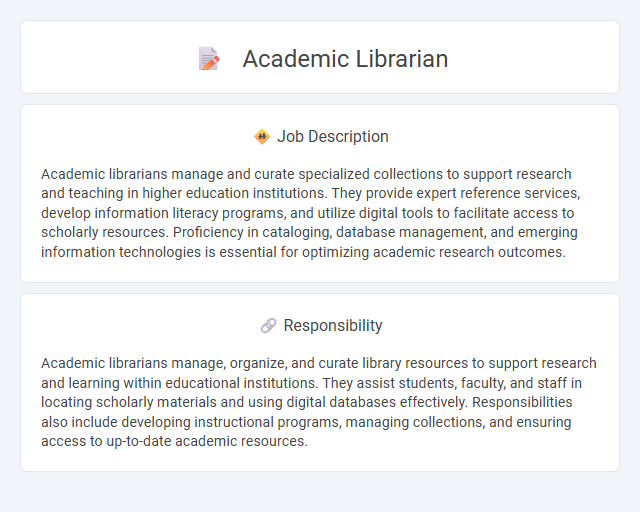
Academic librarians manage and curate specialized collections to support research and teaching in higher education institutions. They provide expert reference services, develop information literacy programs, and utilize digital tools to facilitate access to scholarly resources. Proficiency in cataloging, database management, and emerging information technologies is essential for optimizing academic research outcomes.
Individuals who enjoy organizing information, working closely with students and faculty, and thrive in detail-oriented environments are likely to find academic librarian roles suitable. Those who prefer dynamic interactions and have strong research and communication skills often adapt well to this position. Conversely, people who dislike structured tasks or solitary work may find the job less fitting for their strengths.
Qualification
Academic Librarians typically hold a master's degree in Library Science (MLS) or Information Science (MLIS) from an ALA-accredited institution, ensuring expertise in information management and research methodologies. Proficiency in digital cataloging, reference services, and information literacy instruction is essential for supporting faculty and students in academic environments. Experience with academic databases, metadata standards, and emerging library technologies enhances an Academic Librarian's ability to facilitate access to scholarly resources effectively.
Responsibility
Academic librarians manage, organize, and curate library resources to support research and learning within educational institutions. They assist students, faculty, and staff in locating scholarly materials and using digital databases effectively. Responsibilities also include developing instructional programs, managing collections, and ensuring access to up-to-date academic resources.
Benefit
Academic librarians likely provide significant benefits by enhancing research efficiency and resource accessibility for students and faculty. Their expertise probably ensures the organization and curation of scholarly materials, fostering an enriched learning environment. Support from academic librarians may improve information literacy and contribute to higher academic success rates.
Challenge
The role of an academic librarian likely involves managing rapidly evolving digital resources and adapting to new technologies, which may present significant challenges in resource organization and user training. Navigating the complexity of information literacy among diverse student populations could require continuous development of instructional strategies. Maintaining up-to-date knowledge of scholarly communication trends might also prove demanding, impacting the librarian's ability to support academic research effectively.
Career Advancement
Academic librarians can advance their careers by acquiring specialized skills in digital scholarship, data management, and information literacy instruction to meet evolving campus needs. Pursuing advanced degrees such as a Master of Library Science (MLS) or certifications in emerging technologies enhances opportunities for leadership roles like department head or library director. Active involvement in professional organizations and continuous professional development fosters networking and opens pathways to academic research and administrative positions.
 kuljobs.com
kuljobs.com